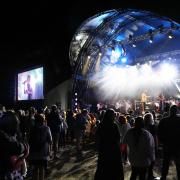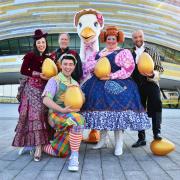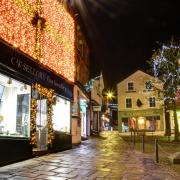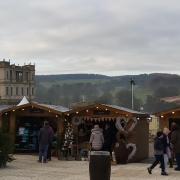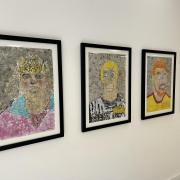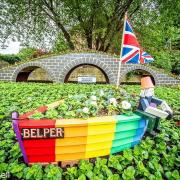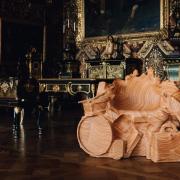David Marley speaks to Professor John Coyne on the 10th anniversary of his appointment as Vice-Chancellor of the University of Derby

It is 10 years since Professor John Coyne took over the custodianship of the office of vice-chancellor at the University of Derby. ‘In the time I have been here we have never borrowed a penny – we have funded our entire growth on our own,’ he recalls proudly. Despite his tenure coinciding with one of the deepest and longest recessions in modern memory, combined with a changing political landscape in the way higher education is funded, this Yorkshire-born academic has successfully and shrewdly guided the institution to a position of remarkable security and growth.
The vice-chancellor’s record of sustaining year-in-year-out expansion and improvement at the university over the past decade is impressive and is very likely to be the envy of many chief executives running similar-sized businesses in the county. The professor’s straightforward philosophy of putting the student at the heart of everything he does, coupled with a candid approach to running the institution, has made him very popular with undergraduates and colleagues alike – and it is not difficult to see why when you look at his many accomplishments.
Student numbers are now at a record high, up from just under 9,000 in 2004 to over 22,000 this year. The university is now a £150 million turnover business, employing over 2,700 people and enjoying high-profile partnerships with private businesses and public sector bodies. The dramatic rise of Derby’s academic standing is also extraordinary. The university has recently been named as a top 50 institution in the Guardian University Guide for 2015 – a rise of 29 places from the 2014 edition, which is the second highest jump in the country of all the 116 universities assessed.
While many other senior executives may be beginning to rest on their laurels, looking forward to retirement and feeling the onset of institutional fatigue, there is no sign of this 63-year-old academic hanging up his gown yet or losing any of his passion for the important role in the life of the county that the University of Derby plays.

‘It is very timely that we are speaking today,’ reflects the professor as he invites me to join him in his modest office at the top of the university’s administration building, ‘because this year marks the tenth anniversary since I took over as vice-chancellor.’ His warm, friendly manner – coupled with a down-to-earth, good-natured approach – makes me feel at ease as he begins to reflect on the last decade of his leadership of the university and his plans and vision for the future. ‘If someone had said to me ten years ago that this is what the university sector would look like; this is how big it would be; and this is how big Derby is within it, I would have thought they were a bit unhinged.’
Derby’s progression up the league tables is astonishing considering that the university only became a higher education institution 22 years ago, in 1992. ‘We’re now a top 50 university,’ he says with great pride. ‘There were a lot of universities that were bigger than us 10 years ago that are now smaller than us.’ He believes the university’s success is because of a willingness to provide high quality education to individuals and businesses, which is relevant to today’s world – ensuring that his graduates are well equipped to lead successful careers. ‘Without a doubt this university is the most routed, the most engaged and the closest to its city than any other in the East Midlands. We have the largest sense of local service.’
This commitment to serve the local community is one of a number of unique factors he believes are responsible for the ongoing growth of the institution. ‘Being a single university city is a huge advantage – it gives us the opportunity to engage and compete, more so than other East Midlands cities such as Nottingham and Leicester, which have two or more higher education institutions within their county boundaries. Interestingly, we have also benefited from the recent economic downturn. It caused people to assess values and priorities resulting in a rebalancing towards manufacturing – towards train makers, plane makers, engine makers and car makers – all of which we have an abundance of in Derby, and that has made a difference to the university,’ he acknowledges.
‘One of our biggest strengths is that this university produces students that can do things, not just think things. Much of our learning goes on in environments that replicate the kind of professional places that they will eventually work in. For example, our fashion students work in a design studio; our textile students learn in an environment which is like a mini-textile factory; our student nurses work in a clinical suite; our law pupils have the benefit of using two courtrooms; and our teachers use an imitation primary school – although the furniture is a bit bigger though!’ he laughs.
The vice-chancellor acknowledges that recent expansions have sometimes led to institutional growing pains, creating many new challenges – for all of which he needs to find solutions. ‘Ten years in one place helps me to bookend things. My first intake back in 2004 was characterized by thinking, how on earth are we going to fill these places? Now I think with this year’s intake, how am I going to ration these places? Our halls of residences are now not only full but also overflowing. It is a lovely to be popular – with the biggest and best quality intake we have ever had,’ he says.
At this point in the interview he realizes he has forgotten to put his trademark University of Derby badge on the lapel of his jacket. ‘I always wear this badge,’ he chuckles. ‘It invites a conversation and gives me an opportunity to be the proactive, loudmouth ambassador of the university – promoting it everywhere I go. I never lose the chance to talk about the University of Derby.’
Professor Coyne’s remit now stretches beyond the purely academic. He is also the chief executive of the university and he serves as a director of the institution’s limited company status. ‘The university is so important to its students, so we have to manage it as a business. Students now want value for money and we have to keep our promises to them. However, what we do is more important than most businesses – I am not just feeding dividends to shareholders, I am delivering life chances to young people.’
He speaks with great pride about his staff and colleagues, attributing most of his achievements to their hard work. ‘We must never forget, this is a people business – we invest wisely in people and this makes our university stronger. We are not a complacent university who employs people for the hell of it – jobs need to be done extremely well. Whether you are a press officer, a cleaner or a groundsman you have to do the best job you can – and if you do you will get my full respect,’ he says.
The professor’s old-fashioned work ethic (which he attributes to his working-class childhood growing up in Barnsley) seems to be infectious, with the vast majority of his students in work whilst they study. ‘Ninety per cent of my students are already working whilst they are studying, many doing part-time jobs. Our students are very competitive. They are lively and engaged, they go out to earn and graft,’ he says. So it was no surprise to him that Derby graduates are becoming some of the most employable in the country. A recent survey by the Higher Education Statistics Agency has revealed that 96.7 per cent of students from the university who’d completed a full-time degree course, were in employment or study six months after completing their course – which puts Derby the tenth highest amongst all UK universities.
Until recently, nearly half the student intake came from people living within 70 miles of the institution. ‘About 40 to 50 per cent of my students will have a Derby, Derbyshire or west Nottinghamshire postcode, but this is changing. Our postcode spread is beginning to grow. Our entire growth this year – about 300 more places – has come from students from outside the area. So our reputation and standing is moving out of the region.’ However, the vice-chancellor is quick to point out that even as the university grows he will never lose touch with his students. ‘We want to be big enough to matter and small enough to care,’ he adds.
Almost proving this point, he leaps from his chair and produces an electronic computer tablet device from his bag. Resembling a proud grandfather, he shows me some of his private photographs many depicting him with former students in the world of work. He knows them all by first name and clearly cares about what they are doing. ‘Everyday students here give me reasons to be proud,’ he says.
He then turns to the corner of his office and asks: ‘Do you see those three ceramic pots in my window? They were made by the Derby artist Paul Cummins and I bought them off him when he was a second year student at the university.’ Paul Cummins’ work is currently on show at the Tower of London. His evolving installation of 888,246 ceramic red poppies – one for each British and Colonial military fatality of the First World War – has attracted national media interest and critical acclaim.
‘I remember Paul when he was a student – he lived in the workshops, his kiln was never cold,’ he remembers proudly. ‘I told the Duke of Devonshire, our Chancellor, about his work and he gave Paul a commission to produce ceramic tulip flowers at Chatsworth. Soon after, his work was displayed in the gardens of the Houses of Parliament. We are all immensely proud of Paul’s achievement. It’s wonderful to see that so much of the skills and resources he needed were found right here in Derby.’
The vice-chancellor’s passion for the university appears to be getting stronger with age. ‘I know I only look 41 but I am really 63-years-old,’ he jokes. ‘I always look forward. Every decade that passes has always been the best. Age is only a state of mind. Institutions matter but people deal with people and we should never lose sight of that. I have a natural curiosity and want to know what is going on. I think Derby University is brilliant and I only know about two per cent of what goes on!’






